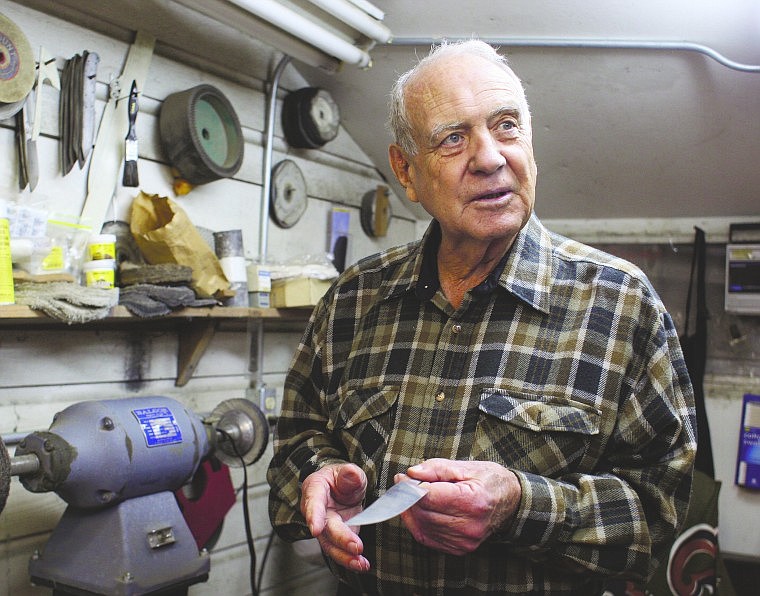Putting a fine edge on his work
Tim Woodward | Hagadone News Network | UPDATED 14 years, 2 months AGO
MIDVALE - He almost blushes as he pulls out the knife he keeps in his jeans pocket a folding knife purchased through a mail-order catalog for $20.
"I can't keep a knife," Dwight Towell says with a sheepish grin. "Every time I make a knife for myself, somebody wants to buy it."
That's about as close as he comes to boasting. He'd never say so, but Towell is one of the top knifemakers in the world. Collectors pay thousands for the handmade knives that come from the austere little shop on his Midvale ranch. The current wait for a Dwight Towell custom knife: five to six years.
A recipient of this year's Governor's Awards in the Arts, Towell is no stranger to prizes. They include the American Knifemakers Guild's top award and the Beretta Award for outstanding achievement in cutlery. A Towell dagger engraved with gold on blued steel graced the cover of a brochure for the Art Knife Invitational in San Diego, to which only the world's top knifemakers are invited. It sold for $12,800.
"Dwight, quite simply, is one of the half dozen finest knife-makers in the
world, and since there can be no fine art without craft, an incredibly talented artist by any measure," said Cort Conley of the Idaho Commission on the Arts. "That he could manage this while being an admirable husband, father and rancher humbles most everyone who knows him."
The Towells have ranched in the Midvale area since his great grandfather, Alexander Towell, homesteaded there in 1881. As a boy, Dwight Towell "always had a knife. I was always whittling or carving my initials in something."
He and his wife, Celia, ranched and raised their family less than a mile from his great grandfather's homestead. He made his first knife, a hunting knife for his son, in 1966.
"There were only about two dozen people in the country making handmade knives then," he said. "They wanted $75 for a hunting knife. I thought that was a terrible price for a knife so I made my own."
That led to more and better knives, friendships with master knifemakers and an apprenticeship with Winston Churchill of Vermont, one of the world's top engravers. The output that began with a single hunting knife now stands at more than 1,200 knives.
In 2004 Towell retired from raising cattle hay and alfalfa his son-in-law handles the ranching now to devote himself full-time to knifemaking. At 76, he still looks like the rancher he is in jeans, flannel shirts, Western hat and still works in his shop every day.
His current project is an engraved dagger decorated with 14- and 24-karat gold and semi-precious stone from Russia. Thirty-eight hours into it Cilia Towell keeps track of his hours - he estimated that it was 25 percent finished.
The knife is a high-school graduation gift - the sixth he's made for a grandchild.
Prices for his working knives, as opposed to what he refers to as fancy knives, start at $350. Enthusiasts buy them for their workmanship and high-quality steel, known for holding an edge.
"One of my customers is pretty high up in Coca-Cola," he said. "He sent a knife back to me to be sharpened, and I still could cut the hair on my arm with it. When I asked him what he'd done with it, he said he'd used it to skin three bull elk."
Another knife, returned after an African hunting trip, really did need sharpening.
"He'd used that one to skin a hippo."
Increased emphasis on "fancy knives" has reduced his production to about a dozen knives a year. Fancy knives take far longer to make than working knives do (220 hours for the $12,800 dagger).
He starts by drawing a design on paper. Then he outlines the knife's shape with a carbide-tipped scriber on a bar of steel and cuts it with a bandsaw. That's followed by grinding and sanding with ever finer sandpaper, ending with a hand-rubbed finish.
The only thing he doesn't do himself is heat-treating, which he hires out to a specialist with an atmosphere-controlled furnace in California. Towell engraves the knives with help from a microscope and air-driven graver tools. The finished product can include gold, jade, Seraphinite, springbok antler, mastodon ivory or other exotic components.
"I like designing knives and working with new materials," he said. "Each knife is a new challenge."
One thing his plans don't include is retirement.
"I have too many people waiting for knives. As long as I can make it from the house to the shop, I'll keep working. What's the old saying? If you enjoy doing what you do, it's not work."
MORE IMPORTED STORIES
ARTICLES BY TIM WOODWARD

Couple grateful for 'son' with Down syndrome
BOISE (AP) - It isn't Edgar Call's age that makes him unique, though it's certainly unusual.

Death of 'Salmon River Caveman' ends Idaho era
BOISE (AP) - Known as the "Salmon River Caveman," Richard Zimmerman lived an essentially 19th century lifestyle, a digital-age anachronism who never owned a telephone or a television and lived almost entirely off the land.

Stepping back in time
A love for leatherwork defines Wetzel
BOISE - Stepping into Ben Wetzel's leather shop is like setting your watch back 60 years.



